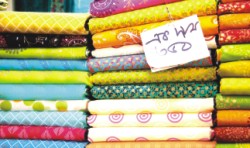Perceptions
What exactly is a
Jakaater Shari?
Mahdin Mahboob
 Come Ramadan and you will be able to see good old Dhaka with a festive look. Shopping malls getting all decorated with lights, the vast majority of the people attending the Jumma prayers in huge congregations and thousands of Iftar Shops springing up, all of them equipped with the 'authentic' recipes of Bombay Jilapi, Shahi Haleem and Doi-bara. But among all these festivities, there is an enigmatic label in some banners which is seen all across the city. 'Ekhaney Jakaater Shari O Lungi Pawa Jai'(Sarees and Lungis for Zakaat are available here) is what it says. Perhaps because of my ignorance in such matters, I fail to comprehend what exactly this means! Come Ramadan and you will be able to see good old Dhaka with a festive look. Shopping malls getting all decorated with lights, the vast majority of the people attending the Jumma prayers in huge congregations and thousands of Iftar Shops springing up, all of them equipped with the 'authentic' recipes of Bombay Jilapi, Shahi Haleem and Doi-bara. But among all these festivities, there is an enigmatic label in some banners which is seen all across the city. 'Ekhaney Jakaater Shari O Lungi Pawa Jai'(Sarees and Lungis for Zakaat are available here) is what it says. Perhaps because of my ignorance in such matters, I fail to comprehend what exactly this means!
So I went forward and did a little research on 'Zakaat'. Here is the summary :
Zakaat is one of the five pillars of Islam. It has been mentioned, along with daily Prayers (Salaat), over seventy times in the Holy Qur'an. Linguistically, Zakaat has two meanings: purification and growth. Technically, it means to purify one's possession of wealth by distributing a prescribed amount to the poor, the indigent, the slaves or captives, and the wayfarer. Zakaat has many benefits on the socio-economic scenario but I'll try to highlight the two key features. Firstly, it functions as a social security for all. Those who have enough money today pay for what they have. If they need money tomorrow they will get what is necessary to help them live decently.
Secondly, and more importantly, Zakaat is the best check against hoarding. Those who do not invest their wealth but prefer to save or hoard it would see their wealth dwindling year after year at the rate of the payable Zakaat. This helps increase production and stimulates supply because it is a redistribution of income that enhances the demand by putting more real purchasing power in the hands of poor. Zakaat becomes obligatory for a Muslim for a minimum amount of money or other assets he/she possesses. After adding up the cash values of the assets, a 2.5% /year Zakaat has been prescribed for all the able Muslims.
Now, coming back to the original question, what could probably describe a 'Jakater Shari'? Something which is of such a low quality that we cannot give to our mothers, sisters or daughters? Something which won't even last till the next year's Eid? Why do we tend to discriminate the poor even while donating? If our sister wears a sari worth 6000 Taka, why can't we give someone poor the same Sari instead of getting 30 low quality, unwearable Saris worth 200 Taka each?
On second thoughts, we the so called privileged classes of the society deserve to wear those cheap lungis and Sari more than the underprivileged. Might sound like a crazy thought at first, but digging a little deep, this idea becomes quite comprehensible. Firstly, we have a closet full of clothes, so if one of them (the Jakater Shari or Lungi) becomes unusable soon, we can always look for alternatives. Secondly, the people who are on the receiving end of these clothes are usually day-labourers and maid-servants which involves strenuous hard work and thus demands strong, long lasting clothes.
We have seen quite a few times in newspapers on how poor people have died in stampedes after going to collect their lungi or Sari for Zakaat. We tend to forget such loss of lives very easily, and the number of deaths become nothing more than a statistic! There should be dependable government and non government organisations involved in this. The floods last year have shown how government organisations like the Prime Minister's Relief Fund and non government organisations like BRAC and a newspaper Prothom Alo have efficiently collected and distributed huge amounts of money and relief goods. This can well be applied to Zakaat as well. It is said that if everyone gave their Zakaat in a proper, systematic way, there would be no poverty left in the country. We are taking different steps in poverty reduction. So let us try to attain a Bangladesh free of poverty through Zakaat.
Web Design: Kazi Ziaur Rahman
Copyright
(R) thedailystar.net 2009 |
